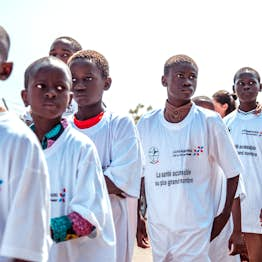Introduction
The year 2019 began with the inauguration of the vocational training centre of Nioro du Rip, constructed with Luxembourgish financing, by the President of the Republic of Senegal, Macky Sall, and the Ambassador of the Grand Duchy of Luxembourg, Nicole Bintner-Bakshian, on 21 January. One week later, a second vocational training centre was inaugurated in the town of Gossas. The two training centres were built under the third Indicative Cooperation Programme (ICP III, 2012-2017) between Senegal and Luxembourg, and were completed in 2018. The year 2019 also saw the continuation of the implementation of the current framework for cooperation with Senegal, the fourth Indicative Cooperation Programme (ICP IV, 2018-2022) signed in 2018 and with an indicative financial envelope of EUR 65 million. The projects under the ICP IV fall within two key areas: (i) health and social protection, and (ii) vocational and technical training (VTT) and the employability of young people.
Read more
Following the news of the death of his Royal Highness Grand Duke Jean, Minister Paulette Lenert had to postpone her participation in an official working visit to Senegal in April 2019. Nevertheless, the technical aspects of the visit took place, enabling the foundation stone to be laid in the treatment centre for victims of sexual violence in Ziguinchor in partnership with the Luxembourgish NGO SAN ACCESS and the regional NGO ENDA Santé. The centre aims to promote a favourable environment for the improvement of the health and well-being of young victims of violence, and in particular sexual violence, in Casamance (Senegal) and neighbouring countries (Gambia, Guinea-Bissau).
The year 2019 also saw the start of activities by the United Nations Population Fund (UNFPA) designed to improve access by the most vulnerable groups to basic health services, with a special emphasis on promoting access for young people, particularly young girls. Thanks to financing from Luxembourg, the UNFPA has been able to scale up the initiative of the young female leaders club for girls, with more than 480 young girls and adolescents enrolled to date in the project’s focus area. In the regions where nearly 30% of girls under 19 are already mothers, the young leaders club aims to strengthen the leadership of adolescents and girls in combating young pregnancies and child marriage, promoting gender aspects, school enrolment for young girls and their employability.
Luxembourg has also continued its long-standing commitment to the World Food Programme (WFP) and its flagship ‘school feeding’ initiative in Senegal and in the sub-region. In Senegal, the WFP provides healthy and nutritional meals daily to 106,000 school-children in 516 primary schools in the six regions with the highest levels of food and nutritional insecurity, promoting, in particular, school attendance by young girls, and good nutritional practices. Produced locally, the school meals stimulate agricultural production and the local economy.
In the areas of health and food, once more, Luxembourg has continued its support to the Food and Agriculture Organization of the United Nations (FAO) for the improvement of monitoring and response capacities in food safety emergency situations in Senegal. Some initial, encouraging results are now available, including Senegal’s adoption of its national food safety emergency response plan. In line with Luxembourg’s Development Cooperation’s wish to support South-South cooperation, Senegal, with a wealth of experience, is now in a position to support Burkina Faso, in turn, to produce and operationalise its national food safety emergency response plan.
Finally, eight Luxembourgish NGOs (Stop Aids Now/ACCESS, Luxembourg Red Cross, Guiden & Scouten, Frères des Hommes, PADEM, ECPAT, Pharmaciens sans frontières, SOS Villages d’Enfants Monde) have run projects in 2019 in Senegal in the sectors of health, nutrition and basic social services, education and vocational training, rural and agricultural development, emergency aid and the elimination of violence against women.
Priority areas of intervention
- Good health and well-being
- Quality education
- Decent work and economic growth
- Reduced inequalities
Development of PDA
Reference data
- Population: 16,296,364
- GNI (per resident): USD 1,450
- Human Development Index (HDI): 166/189
- Life expectancy: 67
- Indicative Cooperation Programme: 2018-2022
Key achievements 2019
- Inauguration of the vocational training centres in Gossas and Nioro du Rip, constructed under the ICP III (January 2019)
- Foundation stone laid for the treatment centre for victims of sexual violence in Ziguinchor in partnership with the Luxembourgish NGO SAN ACCESS and the regional NGO ENDA Santé (April 2019)
- Scaling up of the young female leaders club for girls initiative in Casamance through the UNFPA programme
- Daily meals provided for 106,000 school-children through the WFP school feeding programme

